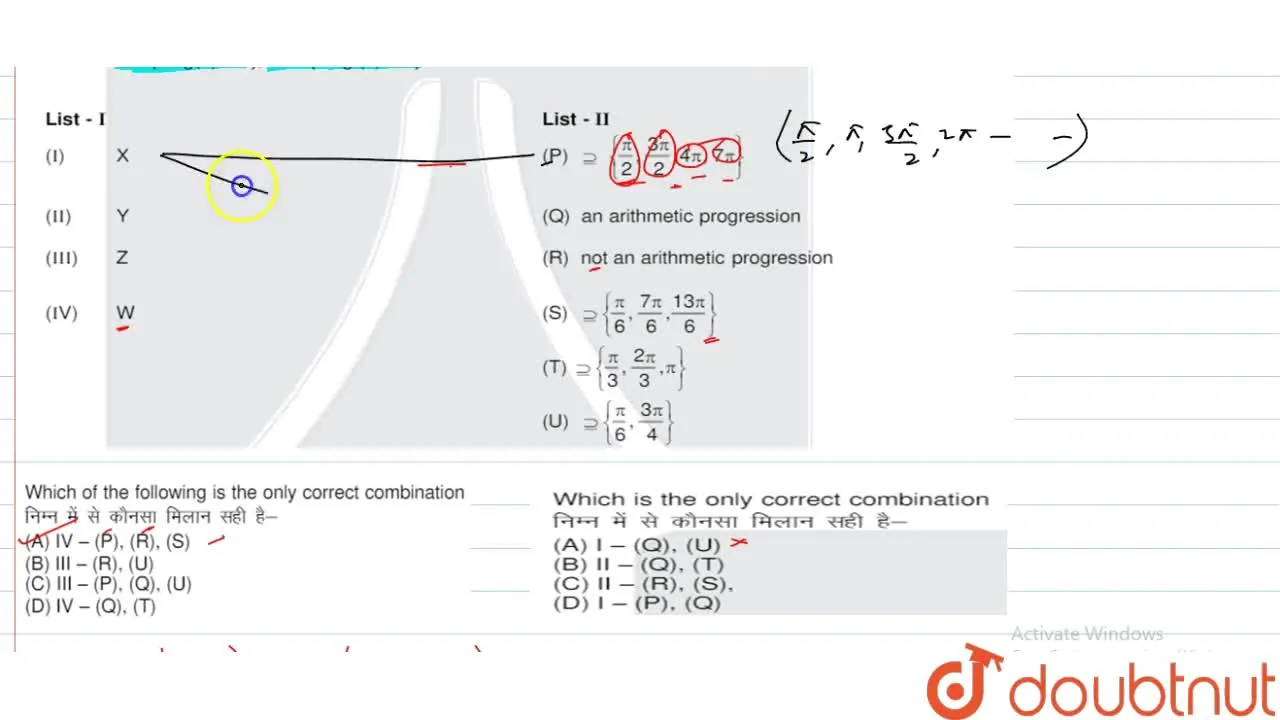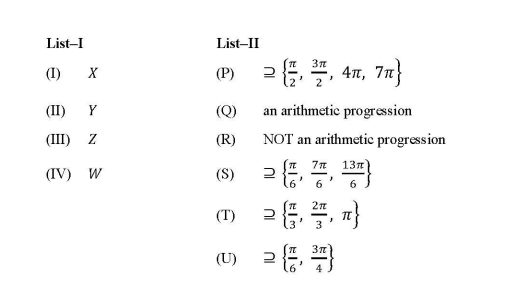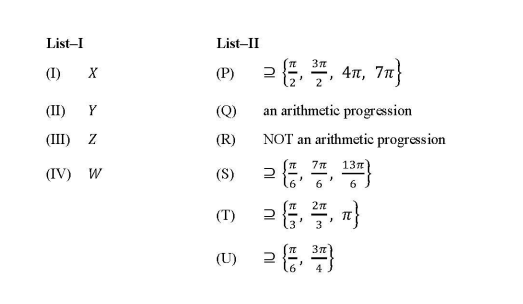Let f(x)= sin(πcosx) and g(x)=cos(1πsinx) e two function defined for x>0 define the following sets whose elements are written in increasing order.
X={x:f(x)=0},Y={x:f'(x)=0}
Z={x:g(x)=0},W={x:g'(x)=0}
List IList II(I) X(P) ⊇{π2,3π2,4π,7π}(II) Y(Q) an arithmetic progression(III) Z(R) not an arithmetic progression(IV) W(S) ⊇{π6,7π6,13π6}(T) ⊇{π3,2π3,π}(U) ⊇{π6,3π4}
Q.
The correct Answer is:D
f(x)=0⇒sin(πcosx)=0
⇒πcosx=nπ⇒cosx=n
⇒cosx=−1,0,1⇒X={nπ,(2n+1)π2}={nπ2,n∈I}
f'(x)=0⇒cos(πcosx)(−πsinx)=0
⇒πcosx=(2n+1)π2 or x=nπ
⇒cosx=n+12 or x=nπ
⇒cosx=±12 or x=nπ
⇒Y={2nπ±π3,2nπ±2π3,nπ,n∈I}
g(x)=0⇒cos(2πsinx)=0⇒2πsinx=(2n+1)π2
⇒sinx=2n+14=±14,±34
⇒Z={nπ±sin−1(14),nπ±sin−1(34),n∈I}
g'(x)=0⇒−sin(2πsinx)(2πcosx)=0
⇒2πsinx=nπ or x=(2n+1)π2
⇒∈x=n2=0,±12,±1 or x=(2n+1)π2
⇒W={nπ,(2n+1)π2,nπ±π6,n∈I}
Related Playlists
Similar Questions
Answer the following by appropriately matching the lists based on the information given in the paragraph.
Let f(x)=sin(πcosx) and g(x)=cos(2πsinx) be two functins defined for x>0. Define the following sets whose elements are written in the increasing order:
X={x:f(x)=0},Y={x:f′(x)=0},Z={x:g(x)=0},W={x:g′(x)=0}
List-I contains the sets X,Y,Z and W. List-II contains such some information regarding these sets:
Which of the following is the only CORRECT combinations?View SolutionAnswer the following by appropriately matching the lists based on the information given in the paragraph.
Let f(x)=sin(πcosx) and g(x)=cos(2πsinx) be two functions defined for x>0. Define the following sets whose elements are written in the increasing order:
X={x:f(x)=0},Y={x:f′(x)=0},Z={x:g(x)=0},W={x:g′(x)=0}
List-I contains the sets X,Y,Z and W. List-II contains such some information regarding these sets:
Which of the following is the only CORRECT combinations?View SolutionThe range of f(x)=sin−1(√x2+x+1)is (0,π2) (b) (0,π3) (c) (π3,π2) (d) [π6,π3]
View SolutionThe function f(x)=tan−1(sinx+cosx) is an increasing function in (−π2,π4) (b) (0,π2) (−π2,π2) (d) (π4,π2)
View SolutionRange of function f(x)=arot(2x−x2), is [π4,3π3] (b) [0,π4] [0,π2] (d) [π4,π]
View Solution1+sinx+sin2(x)+....=4+2√3,0<x<π,x≠π,thenx=
1) π3,π4 2) π4,π6 3) 2π5,π6 4) π3,2π3View Solution[ If f(x)=|[x^(2)+sin x cos x,x(1+sin x)x+cos x,x+1]|, then at least one root of f(x)=0 lies in [ (1) (0,(pi)/(6)), (2) (0,(pi)/(4)) (3) ((pi)/(4),(pi)/(3)), (4) ((pi)/(6),(pi)/(4))]]
View Solutionsin(π3−x)cos(π6+x)+cos(π3−x)sin(π6+x)=1
View SolutionThe function f(x)=tan−1(sinx+cosx) is an increasing function in (1) (π4,π2) (2) (−π2,π4) (3) (0,π2) (4) (−π2,π2)
View Solutionf(x) = cos x is strictly increasing in the interval :
(a)(π2,π)
(b) (π,3π2)
(c) (0,π2)View Solution




